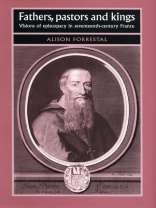This electronic version has been made available under a Creative Commons (BY-NC-ND) open access license. This book explores how conceptions of episcopacy (government of a church by bishops) shaped the identity of the bishops of France in the wake of the reforming Council of Trent (1545–63). It demonstrates how the episcopate, initially demoralised by the Wars of Religion, developed a powerful ideology of privilege, leadership and pastorate that enabled it to become a flourishing p...
विषयसूची
Introduction 1. Catholic renewal and episcopal traditions in the sixteenth century 2. The most perfect state – French clerical reformers and episcopal status 3. Lower clerg...
लेखक के बारे में
William G. Naphy is Senior Lecturer in History and Head of Department at the University of Aberdeen







![का आवरण Brian Schrag & Julisa Rowe: Community Arts for God's Purposes [Chinese] 貼近神心意的社群藝術 का आवरण Brian Schrag & Julisa Rowe: Community Arts for God's Purposes [Chinese] 貼近神心意的社群藝術](https://static.worldofdigitals.com/thumb_webp/740/9781645083740.webp)




